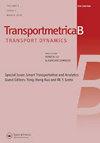平台声誉有限的约车市场随机演化动态博弈模型
IF 3.4
2区 工程技术
Q2 TRANSPORTATION
引用次数: 0
摘要
本文章由计算机程序翻译,如有差异,请以英文原文为准。
A stochastic evolutionary dynamic game model for analyzing the ride-sourcing market with limited platform reputation
Ride-sourcing services have become increasingly vital in meeting on-demand mobility needs. However, safety issues and public health concerns are obstacles for passengers' trust in ride-sourcing service providers. In this paper, we propose a stochastic evolutionary dynamic game approach to modeling and managing the ride-sourcing market with limited platform reputation, and interpret some intriguing phenomena in terms of passengers' and drivers' travel behavior, e.g. survivor bias, reciprocity, and tragedy of the commons. A stochastic state dynamic game model is formulated to capture complicated interactions among three games/states, i.e. trust game, complaint game, and rating-based game. The stationary distribution of each state and transitional probabilities are deducted from the stochastic game theory. We analyze the ride-sourcing system's evolution and reveal its intrinsic mechanism based on the model. We found that, if the governmental support for complaints is inadequate and passengers bear the high complaint costs, drivers will be more inclined to compensate passengers privately (i.e. reciprocity) to escape punishment for unqualified service. As a result, the service quality will deteriorate in the long run. To prevent the deterioration of service quality, we explore adaptive pricing strategies for the ride-sourcing platform and suggest managerial strategies for the government. This paper bridges the gap between the dynamic evolution and the mechanism of trust in ride-sourcing services, which has been seldom studied in the literature. All of the analytical results are illustrated by numerical experiments.
求助全文
通过发布文献求助,成功后即可免费获取论文全文。
去求助
来源期刊

Transportmetrica B-Transport Dynamics
TRANSPORTATION SCIENCE & TECHNOLOGY-
CiteScore
5.00
自引率
21.40%
发文量
53
期刊介绍:
Transportmetrica B is an international journal that aims to bring together contributions of advanced research in understanding and practical experience in handling the dynamic aspects of transport systems and behavior, and hence the sub-title is set as “Transport Dynamics”.
Transport dynamics can be considered from various scales and scopes ranging from dynamics in traffic flow, travel behavior (e.g. learning process), logistics, transport policy, to traffic control. Thus, the journal welcomes research papers that address transport dynamics from a broad perspective, ranging from theoretical studies to empirical analysis of transport systems or behavior based on actual data.
The scope of Transportmetrica B includes, but is not limited to, the following: dynamic traffic assignment, dynamic transit assignment, dynamic activity-based modeling, applications of system dynamics in transport planning, logistics planning and optimization, traffic flow analysis, dynamic programming in transport modeling and optimization, traffic control, land-use and transport dynamics, day-to-day learning process (model and behavioral studies), time-series analysis of transport data and demand, traffic emission modeling, time-dependent transport policy analysis, transportation network reliability and vulnerability, simulation of traffic system and travel behavior, longitudinal analysis of traveler behavior, etc.
 求助内容:
求助内容: 应助结果提醒方式:
应助结果提醒方式:


